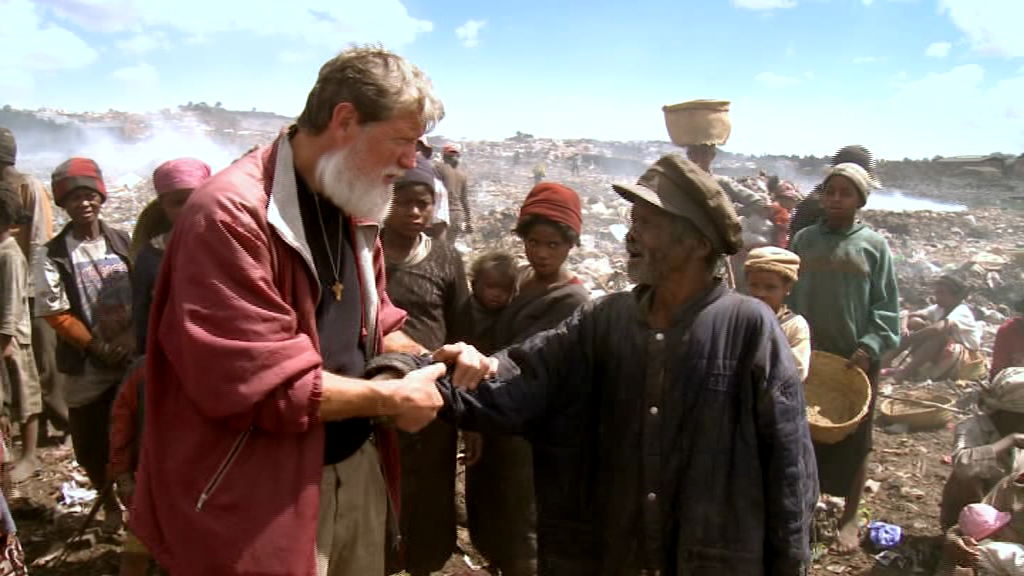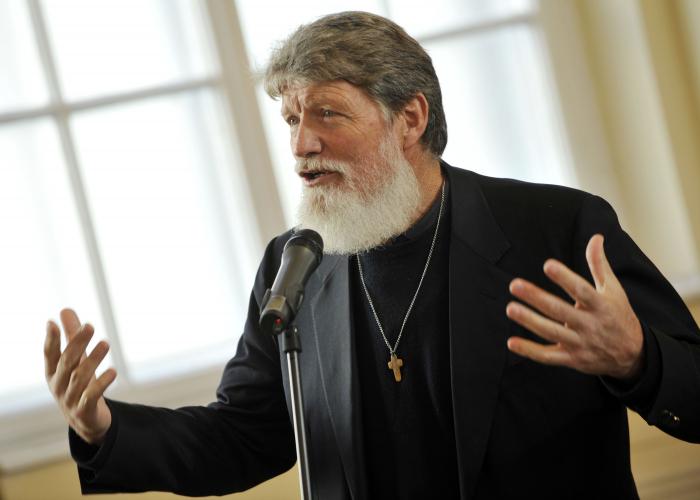
Fight against poverty, promotion of moderate consumption and environmental protection make Pedro Opeka a global example for solving the world's gravest problems.
In an effort to learn more about the world, especially the poor, he hitchhiked as a student through most European countries, as well as in Morocco and Israel, and even sold shoes in Harlem, New York. His uplifting adventures and his subsequent work among the poorest of the poor have been vividly described in many books in various languages (French, German, Slovenian, Spanish, and English). Pedro soon noticed the extreme poverty in the slums of the city and discovered the degradation of the “garbage people,” scavenging the garbage disposal hills trying to find something to eat or to sell. He decided that no one should live in such extreme degradation and that his first task should be to help these poorest of the poor. Thus, he obtained some land and persuaded the first group of the most destitute to leave the slums and trash hills and improve their lot by becoming farmers. He taught men how to make brick and become bricklayers, building homes and infrastructure for villages in their new “communities of friends” or Akamasoa.
From modest beginnings in 1989, Pedro’s projects have grown by leaps and bounds
Former garbage people have achieved human dignity by means of hard work, developing self-esteem and a sense of responsibility for themselves and for the entire community. The world began to notice! In 2005, visiting journalists of Paris Match magazine described about 17,000 of Pedro’s people who had been rescued from slow death on the trash hills of Antananarivo, Madagascar, and proudly worked in various shops, on farms and in the quarry, while over 8,000 of their children received surprisingly good education in schools established by Pedro. And there was Pedro’s Akamasoa’s Welcome Center where about 200,000 transients have by then received food, clothing, medical care and counselling. By 2012, statistics have increased to over 23,000 villagers, including more than 10,000 children and over 300,000 transients, who received temporary help. In cooperation with Akamasoa, which he had founded, four maternity wards, as well as four general hospitals for the poor whom no one would treat were established, built in areas of the greatest need, from the capital city of Antananarivo to remote, isolated rural areas over 900 kilometres or 560 miles away, where properly trained native staff, physicians, dentists, midwives and nurses care for the indigent patients. During the last year alone 35,890 patients were treated!
I bring the joy of my life
"I bring the joy of my life. This is not a fake joy, it comes from experience from living in Madagascar for 40 years. It is probably hard to imagine that talents and charisma can be successfully utilised in such a poor area as a dump in Madagascar. On the contrary, there they can be even more pronounced. Here, you have strong material foundations, but weak values, and wealth lulls humans and kills all initiatives. Your future is secure at least for a couple of months, while there we live from one day to the next. In poorer places people are happier, simpler, more accessible and open. When people are poor and lose everything, when masters throw them on the street and when families live in inhumane conditions, they can come to us. They explain their situation and if we see that they are telling the truth and truly want to escape poverty, their families are accepted immediately. Our association currently has 17,000 members, who live with us, but we have helped more than 300,000 people already. In 20 years we have built more than 3,000 houses. Everyone can become member of the association under three conditions: they need to work, the education and schooling of children are obligatory and they have to accept our discipline."
What do you recommend to Europe and Slovenia?
"The crisis was expected. Those who were able to consider the situation in the long-term knew that our egoistic economy was reckless. We didn't know how to share, and in abnormal comfort our standards of living were too high. We exploited land, spent money and lived fake lives. We took loans for everything and led unrealistic lives. When this stopped somewhere, everything collapsed. Economy must be built on work, reality and fairness. Current economy was built on artificial basis and was therefore not able to last. The objective of large companies is not creating jobs but ensuring fast earnings and becoming rich with the least amount of effort. The richer the companies got, the more they laid off employees, thus increasing the poverty.
If the whole world lived by American standards, we would need six Earths. And why wouldn't we all live by the same standards, why would the Americans live better lives than others and why should all economies serve the American economy? If the trust in the economy is not restored, there is no future for it.
The egoistic economy hit a wall and something new needs to be discovered. And we will discover something. Values, such as solidarity, equality and fairness, offer a way out of this crisis and jobs should be provided to people. Such economy is possible. We need to consider every human being and every country."
According to Opeka all dumps in the world should be closed. "We are fighting for that in Madagascar. This shows no respect for human beings. Nobody can convince us that you can survive at a dump. This is not dignified. Funds for schooling the children were donated by good people. However, our job is to tell the people that assistance from the outside is limited and will cease at some point. We encourage them to stand on their own two feet."
Vesna Žarkovič, SINFO



































































